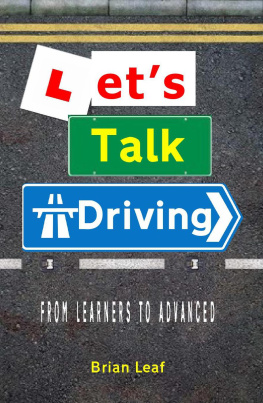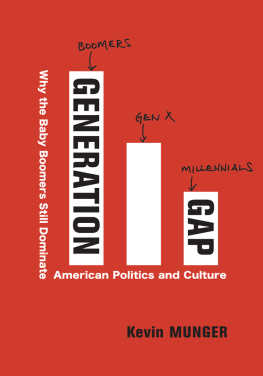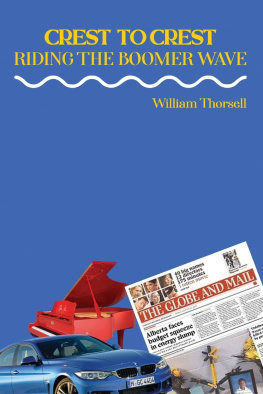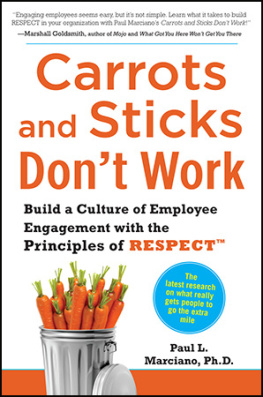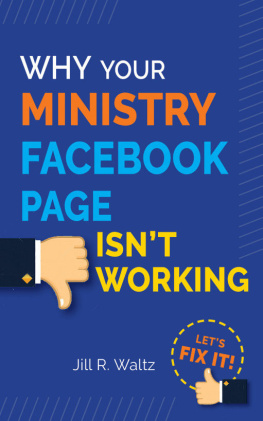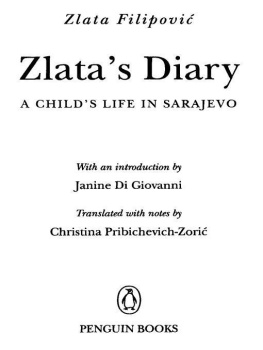Jill Filipovic - OK Boomer, Lets Talk: How My Generation Got Left Behind
Here you can read online Jill Filipovic - OK Boomer, Lets Talk: How My Generation Got Left Behind full text of the book (entire story) in english for free. Download pdf and epub, get meaning, cover and reviews about this ebook. year: 2020, publisher: Atria/One Signal Publishers, genre: Home and family. Description of the work, (preface) as well as reviews are available. Best literature library LitArk.com created for fans of good reading and offers a wide selection of genres:
Romance novel
Science fiction
Adventure
Detective
Science
History
Home and family
Prose
Art
Politics
Computer
Non-fiction
Religion
Business
Children
Humor
Choose a favorite category and find really read worthwhile books. Enjoy immersion in the world of imagination, feel the emotions of the characters or learn something new for yourself, make an fascinating discovery.

- Book:OK Boomer, Lets Talk: How My Generation Got Left Behind
- Author:
- Publisher:Atria/One Signal Publishers
- Genre:
- Year:2020
- Rating:4 / 5
- Favourites:Add to favourites
- Your mark:
- 80
- 1
- 2
- 3
- 4
- 5
OK Boomer, Lets Talk: How My Generation Got Left Behind: summary, description and annotation
We offer to read an annotation, description, summary or preface (depends on what the author of the book "OK Boomer, Lets Talk: How My Generation Got Left Behind" wrote himself). If you haven't found the necessary information about the book — write in the comments, we will try to find it.
OK Boomer, Lets Talk: How My Generation Got Left Behind — read online for free the complete book (whole text) full work
Below is the text of the book, divided by pages. System saving the place of the last page read, allows you to conveniently read the book "OK Boomer, Lets Talk: How My Generation Got Left Behind" online for free, without having to search again every time where you left off. Put a bookmark, and you can go to the page where you finished reading at any time.
Font size:
Interval:
Bookmark:
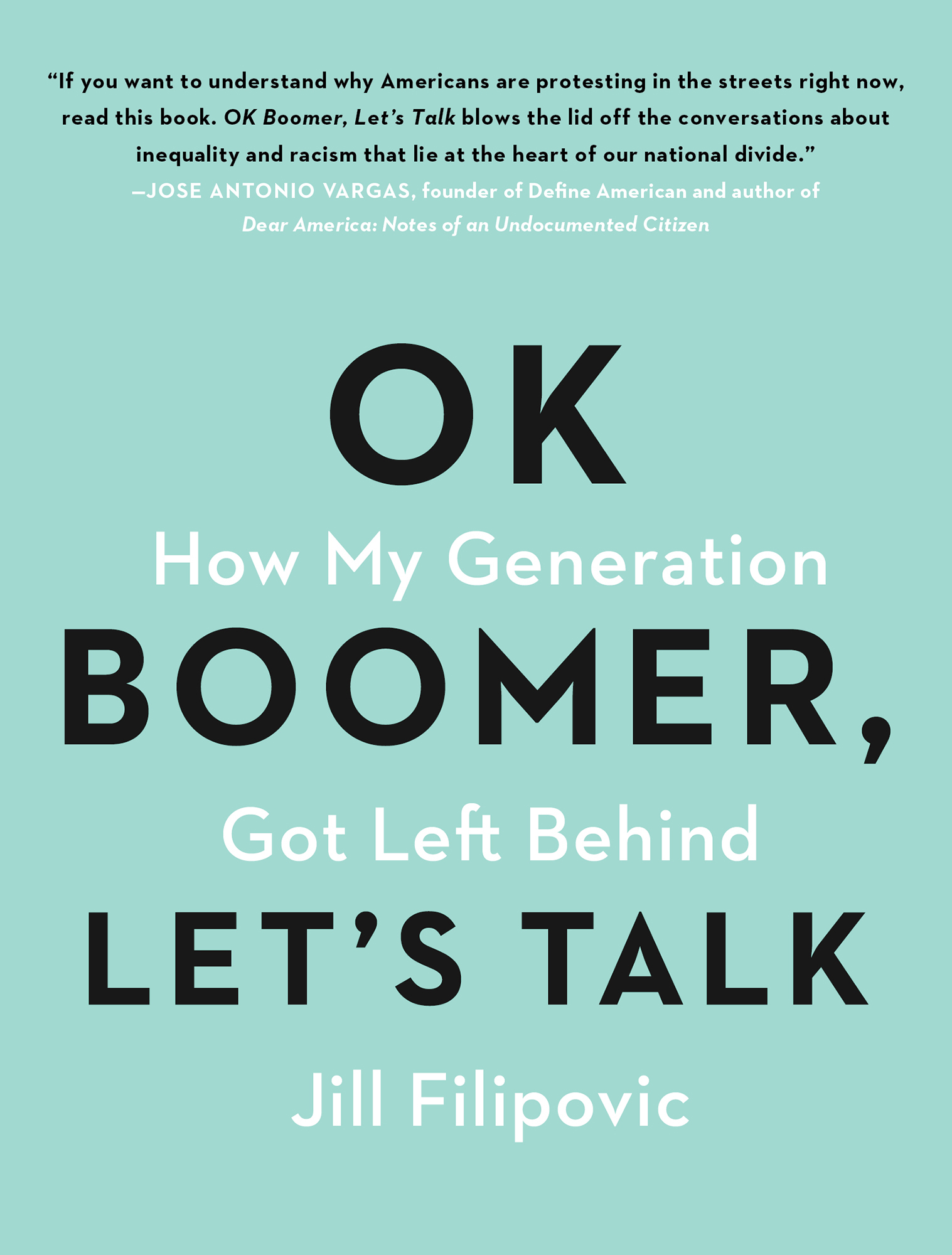

Also by Jill Filipovic
The H-Spot: The Feminist Pursuit of Happiness

An Imprint of Simon & Schuster, Inc.
1230 Avenue of the Americas
New York, NY 10020
www.SimonandSchuster.com
Copyright 2020 by Jill Filipovic
All rights reserved, including the right to reproduce this book or portions thereof in any form whatsoever. For information, address Atria Books Subsidiary Rights Department, 1230 Avenue of the Americas, New York, NY 10020.
First One Signal Publishers/Atria Paperback edition August 2020
 and colophon are trademarks of Simon & Schuster, Inc.
and colophon are trademarks of Simon & Schuster, Inc.
For information about special discounts for bulk purchases, please contact Simon & Schuster Special Sales at 1-866-506-1949 or .
The Simon & Schuster Speakers Bureau can bring authors to your live event. For more information or to book an event, contact the Simon & Schuster Speakers Bureau at 1-866-248-3049 or visit our website at www.simonspeakers.com.
Interior design by Debbie Berne
Cover design by James Iacobelli
Author photograph Gary He
Library of Congress Cataloging-in-Publication Data is available.
ISBN 978-1-9821-5376-2
ISBN 978-1-9821-5377-9 (ebook)
For my favorite Boomers, Mom and Dad, who are pretty okay.
Old man, look at my life
Im a lot like you were
Neil Young
A conservative radio host called it the n-word of ageism. A Supreme Court justice asked if saying it while deciding whether or not to hire someone might qualify as age discrimination. The novelist and critic Francine Prose suggested it was evidence of bigotry against the elderly.
OK Boomer.
No, its not nice. But a petty insult isnt what started the generation wars. It was merely the first return fire to really sting Boomers, in a battle nearly as old as the millennium.
Can you blame us for firing back? The Millennial stereotype of an indulged, immature, hypersensitive narcissist is a convenient mask for the ugly realities that make our lives emotionally and economically precariousrealities set in motion by Baby Boomers. OK Boomer is more than just an imperious insult; its frustrated Millennial shorthand for the ways the same people who created so many of our problems now pin the blame on us. Its us realizing were never going to win inane arguments over our own purported ineptitude, and so best to just short-circuit the debate.
Older Americans have been maligning Millennials since the oldest of our generation graduated high school, and Millennial continues to be used interchangeably with young. But Millennials were born between 1980 and 1996, which means the youngest Millennials are in their midtwenties, while the oldest are pushing forty. We are widely chastised but poorly understood. Conservative news outlets still dedicate entire segments to lampooning easily triggered Millennial college studentseven though most college students are Gen Zers. In a press briefing in March 2020, White House officials suggested that Millennials bore disproportionate responsibility for Americas COVID-19 outbreak. Hey, millennials, this isnt spring break. Its a pandemic, the Philadelphia Daily News tweeted. Early in the outbreak, a New York Times article asserted that Millennials, many of whom entered the workforce into the 2008 recession, are now facing their first economic crisis.
The tropes are almost pass at this point: Millennials want participation trophies for everything. Were delicate special snowflakes demanding safe spaces and trigger warnings. Were obsessed with identity politics and sneer Check your privilege instead of debating in good faith. Were socialism-curious at best, America-hating communists at worst. We expect to be rewarded and promoted and head-patted and hand-held. Were at once too self-involved and too concerned with the feelings of everyone else. We want immediate gratification and crave the affirmation of likes and retweets. Were self-indulgent perpetual adolescents who refuse to grow up. We live in Moms basement, dont have a job, dont have babies, dont even pay rent. We gorge on avocado toast instead of buying homes. The cartoon image of the Millennial, the writer Jia Tolentino put it in The New Yorker, is a twitchy and phone-addicted pest who eats away at beloved American institutions the way boll weevils feed on crops. An abridged list of the beloved institutions weve killed: America, American cheese, the American dream, banks, bar soap, beer, business wear, cable television, canned tuna, cars, casual dining restaurants, cereal, college football, credit, cruises, dairy, democracy, department stores, diamonds, dinner dates, doorbells, dress codes, the European Union, fabric softener, golf, gyms, Home Depot, hotels, light yogurt, lottery tickets, marriage, mayonnaise, McMansions, motherhood, motorcycles, napkins, razors, sex in parks, and wine corks. We are, as one books title put it, The Dumbest Generation.
The first big outpouring of OK Boomer was on TikTok, in response to a video of an older man proclaiming that Millennials and Generation Z have the Peter Pan syndrome: they dont ever want to grow up; they think that the utopian ideals that they have in their youth are somehow going to translate into adulthood. And that somehow theyre going to create this utopian society in which everything is equal. OK Boomer, came the irreverent Gen Z reply. The meme exploded into the mainstream when the journalist Taylor Lorenz wrote about it in the New York Times. Off of TikTok and into the pages of the Gray Lady, OK Boomer suddenly had Boomers attention.
Tired of being lectured and scorned by the older folks who torched their futures, teenagers and twentysomethings struck back, and OK Boomer was their revenge. Now its emblazoned on t-shirts and tote bags. Its the go-to dismissal of a bad tweet or a parental command. Fox even filed to secure a trademark on it (they failed).
Meanwhile, Millennials picked up the meme and ran with it.
One irony in the story of this generation war is the close personal ties between Boomers and Millennials. Boomers were the original parent-friends, developing relationships with their children that put authority aside in favor of genuine respect and mutual connection. In the process of writing this book, I heard from hundreds of Millennials via both survey and in individual interviews. Most of the Millennials I talked to were critical of Boomers as a generationselfish was the most common descriptorbut said that their own Boomer parents were great. OK Boomer doesnt mean my Boomer; Im talking about Boomers out in the wild.
Many of these same Millennials were quick to note that our Boomer parents gave us a nurturing base from which to grow. They encouraged us to do what we love, pursue our passions, and never settle. They allowed us the room to explore creative fields and seek meaningful work. They modeled good parenting, and, for many Millennials with kids, Boomer parents fill the holes in our thin safety net by helping out with childcare. For all of this, many of us are individually grateful.
But much of what individual Boomers did for the benefit of their own kids their generation didnt do for society at large. Instead, they hoarded resources for themselves. They redirected tax dollars toward their own entitlements and away from investments in younger generations, enjoying the security of Medicare and Social Security while we struggle to get decent health care and look forward to empty federal coffers when we retire. They refused to adequately combat the threat of climate change. They walked back earlier progress toward racial equality, which left our more diverse generation broke and struggling. They allowed the gap between the wealthiest few and the poorest many to expand into a vast gulf. So yes, were a little resentful. And when Boomers then berate us for a litany of perceived flaws? We get angry.
Font size:
Interval:
Bookmark:
Similar books «OK Boomer, Lets Talk: How My Generation Got Left Behind»
Look at similar books to OK Boomer, Lets Talk: How My Generation Got Left Behind. We have selected literature similar in name and meaning in the hope of providing readers with more options to find new, interesting, not yet read works.
Discussion, reviews of the book OK Boomer, Lets Talk: How My Generation Got Left Behind and just readers' own opinions. Leave your comments, write what you think about the work, its meaning or the main characters. Specify what exactly you liked and what you didn't like, and why you think so.

